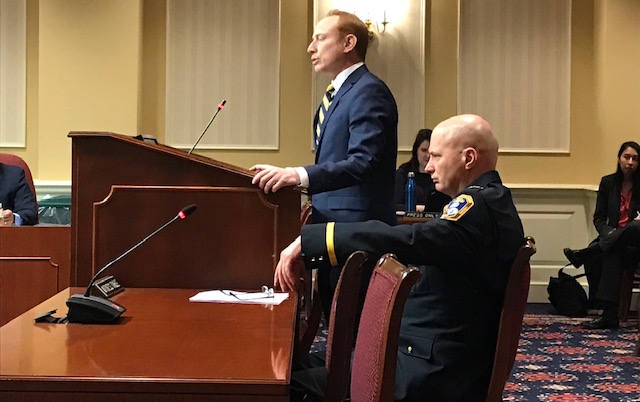@BryanRenbaum
Sen. Jeff Waldstreicher (D-Montgomery) on Thursday urged a panel of Maryland lawmakers to approve legislation that would provide for the automatic expungement of criminal records related to marijuana possession in cases where no other convictions took place.
“Senate Bill 699 as introduced provides automatic expungement for the mere possession of marijuana where the mere possession of marijuana was the only conviction and was not part of a series of other drug crimes that might include more serious offenses – like dealing and the like,” Waldstreicher said at a Senate Judicial Proceedings Committee hearing in Annapolis.
Waldstreicher. the lead sponsor of the bill, noted that the House version of the bill is slightly different than its Senate companion. Del. David Moon (D-Montgomery) is the lead sponsor of the House bill. The House Judiciary Committee held a hearing on the legislation on Jan. 28. Both bills were previously introduced during the 2017 legislative session. Waldstreicher relayed that the House bill provides for the “automatic shielding” of records rather than automatic expungement.
“Instead of doing what the bill as introduced does – which is create an automatic expungement – it simply changes that to essentially create an automatic shielding. That language was done by the House sponsor working with [Maryland District Court] Chief Judge [John] Morrissey. And so, we’ll make sure that that amendment is provided to the committee.”
Morrissey testified in opposition to the Senate bill. He suggested support for the amended House bill.
“We’ve worked very closely with Delegate Moon and with respect to the amendments that he has to the House Bill 83 – which I understand from Senator Waldstreicher would be the same as the amendments that he was going to submit. We do support those. We worked with him closely and we are good to go with that and we can do that. It’s a step.”
Morrissey clarified that blocking access to the records of marijuana convictions on the popular criminal background check website Maryland Judiciary Case Search is doable whereas automatic expungement would be more difficult to carry out.
“What we can do is block this from Case Search. We can provide relief for about 210,000 cases. So those will go away from Case Search. You will not be able to find them on Case Search. There’d be no record of them. It does not speak to what happens at the courthouse. That’s a whole other question.”
Baltimore County State’s Attorney Scott Shellenberger also testified against the legislation.
“The thing that I mainly object for is that the legislature currently has a commission made up of all legislators who are studying the issue of marijuana.”
Shellenberger relayed that he and other state’s attorneys have testified before the commission.
“As we got into the hearing it became quite obvious that that issue [expungement] was extremely complicated. So its the position of the state’s attorneys that we need to wait for your legislative commission to come out with a holistic approach on this issue of marijuana and how we’re going to approach it going forward. And this piecemeal approach by picking this out right now is pretty difficult.”
Shellenberger said that under current law, defendants must request expungement and his office keeps track of expungement petitions. He said the legislation would make that task more difficult and would burden state’s attorneys offices with more paperwork.
“It’s at that time that I and the judiciary know that somebody wants this done. If it’s automatic, we don’t have an ability to press a button at the end of four years or three years – or whatever the time period is to find these things. So, in fact, the way the bill is currently drafted – it’s an unfunded mandate to various state’s attorneys’ offices. I have one law clerk who does expungements. I don’t have a unit.”
The legislation would, according to its text, require “all court records and police records relating to certain charges of possession of marijuana to be automatically expunged on or before certain dates under certain circumstances.” It would require a “court with certain jurisdiction to initiate efforts to automatically expunge all court records and police records relating to a certain charge 4 years after disposition of the charge.” It would require “expungement of court records and police records relating to a certain case to be completed on or before 4 years and 90 days after disposition.”







Recent Comments